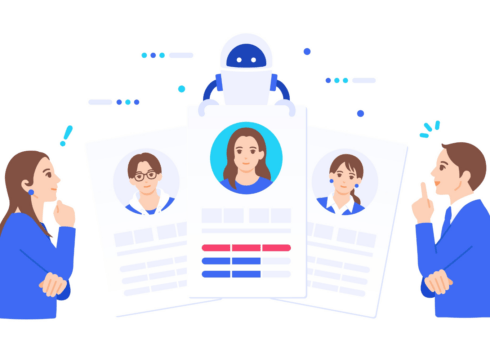In the contemporary HR landscape, data-driven decision-making stands as the backbone for organisational success
As per a report from a smart company interview provider, 55% of the companies are investing more toward automated recruiting measures that use AI
For businesses looking to stay competitive in talent acquisition, the message is clear: embrace the power of data
Inc42 Daily Brief
Stay Ahead With Daily News & Analysis on India’s Tech & Startup Economy
With data taking centre stage in decision-making across all facets of business, it holds a huge implication for hiring. The hiring landscape stands at the threshold of an exciting era powered by data as well as artificial intelligence (AI). These technological advancements are considered no less than a boon for people management and creating intelligent processes to streamline operations for HR professionals.
In the contemporary HR landscape, data-driven decision-making stands as the backbone for organisational success. The transformative role of data in hiring is ushering in a new era of recruitment where big data and advanced analytics drive informed decision-making.
While businesses can leverage the power of data and AI, they must keep the human touch at the centre of all their processes by blending technology and people-centric approaches. Intelligent HR, leveraging machine learning, natural language processing, and predictive analytics, navigates the delicate balance between technological efficiency and human-centric practices.
The strategic importance of harnessing data is to manage and nurture the organisation’s most invaluable asset: its human capital.
Data-Driven Hiring And Its Advantages
Traditionally, recruitment has been a human-centric process, relying on the experience and judgement of human hiring managers. However, the integration of big data and analytics tools has brought about a significant change in the hiring ecosystem. This transition from intuition-based to analytics-driven strategies is not just a trend but a fundamental change in how we approach talent acquisition.
Recruitment analytics involves the methodical analysis of data at every stage of the hiring process. This encompasses a broad spectrum, ranging from candidate sourcing and screening to interview strategies and hiring outcomes.
The advent of modern recruitment tools, such as applicant tracking systems (ATS) and AI-driven candidate screening software, has enabled businesses to harness the power of various metrics in their quest for the perfect candidate. As per a report from a smart company interview provider, 55% of the companies are investing more toward automated recruiting measures that use AI.
Let’s take a look at the benefits of data in hiring:
Improved Quality Of Hire
Data analytics acts as a guiding light for hiring managers towards candidates who not only possess the required qualifications but also seamlessly align with the company culture. By analysing past hiring successes and failures, businesses can refine their criteria, ensuring a better fit between candidates and organisational values.
Reduced Time-to-Hire
With automation and the strategic use of analytics, the hiring process can be streamlined, significantly slashing the time it takes to fill a vacant position. Automated tools can efficiently sift through resumes, identify the most promising candidates, and accelerate the decision-making process, allowing organisations to swiftly secure top talent ahead of competitors.
Enhanced Candidate Experience
Data-driven hiring isn’t just about the organisation; it also transforms the experience for candidates. By leveraging analytics, businesses can create a more personalised and engaging recruitment journey. Understanding candidate preferences, tailoring communications, and providing timely feedback contribute to an overall positive experience.
Decreased Hiring Costs
The optimisation of recruitment strategies through data analytics can lead to substantial cost savings. By identifying the most effective channels for candidate sourcing minimises redundancies in the hiring process to make informed decisions. These steps can help organisations trim down their overall hiring expenses.
The Way Forward
While data-driven hiring comes with benefits, it also has some challenges. Data privacy and the potential for algorithmic bias are some key concerns that must be addressed by organisations. It’s crucial to ensure that data collection and analysis are conducted ethically and transparently.
By embracing a data-centric approach, companies can make more informed, efficient, and unbiased hiring decisions. For businesses looking to stay competitive in talent acquisition, the message is clear: embrace the power of data.
The future of hiring is undeniably intertwined with data, and those who embrace this transformation are poised to build stronger and more resilient teams.
Key Highlights
Funding Highlights
Investment Highlights
Acquisition Highlights
Financial Highlights
Note: We at Inc42 take our ethics very seriously. More information about it can be found here.






